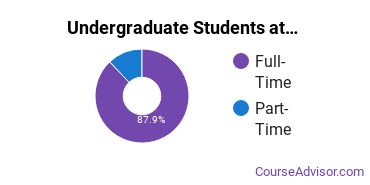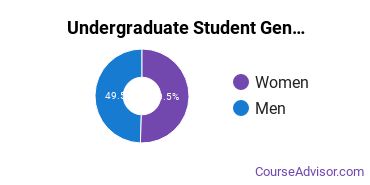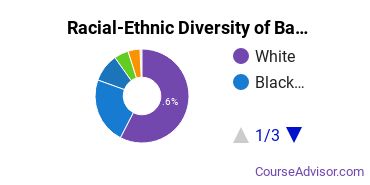Barton College Overview
Located in Wilson, North Carolina, Barton College is a private not-for-profit institution. The location of Barton College is a good match for students who are interested in living in a college town while they pursue their degree.
What Is Barton College Known For?
- The master's degree is the highest award offered at Barton College.
- During a recent academic cycle, 98% of the faculty were full-time.
- After graduation, Barton College bachelor's degree recipients go on to jobs where they make $47,913 a year. That's about 17% more than their peers at other schools.
- It takes the average Barton College student 4.2 years to graduate. This is pretty good when compared to the national rate of 4.4 years.
Where Is Barton College?

Contact details for Barton College are given below.
| Contact Details | |
|---|---|
| Address: | 200 E. Acc Drive, Wilson, NC 27893-7000 |
| Phone: | 252-399-6300 |
| Website: | www.barton.edu |
How Do I Get Into Barton College?
You can apply to Barton College online at: https://connect.barton.edu/ICS/Admissions/
Admission Requirements for Barton College
| Submission | Required? |
|---|---|
| High School GPA | 1 |
| High School Rank | 3 |
| High School Transcript | 1 |
| College Prep Program | 5 |
| Recommendations | 5 |
| SAT or ACT Scores | 5 |
| TOEFL | 1 |
How Hard Is It To Get Into Barton College?
Approximately 43% of accepted students are men and 57% are women. The acceptance rate for men is 93%, and the acceptance rate for women is 95%.
Barton College received ACT scores from 1% of accepted students.
Can I Afford Barton College?
The net price is calculated by adding tuition, room, board and other costs and subtracting financial aid.
Student Loan Debt
While almost two-thirds of students nationwide take out loans to pay for college, the percentage may be quite different for the school you plan on attending. At Barton College, approximately 74% of students took out student loans averaging $6,874 a year. That adds up to $27,496 over four years for those students.
Explore Best Ranked Schools for You
Barton College Undergraduate Student Diversity

There are also 72 graduate students at the school.
Gender Diversity
Of the 1,003 full-time undergraduates at Barton College, 48% are male and 52% are female.

Racial-Ethnic Diversity
The racial-ethnic breakdown of Barton College students is as follows.

| Race/Ethnicity | Number of Grads |
|---|---|
| Asian | 9 |
| Black or African American | 234 |
| Hispanic or Latino | 91 |
| White | 572 |
| International Students | 40 |
| Other Races/Ethnicities | 57 |
Geographic Diversity
North Carolina students aren't the only ones who study at Barton College. At this time, 20 states are represented by the student population at the school.
Over 19 countries are represented at Barton College. The most popular countries sending students to the school are United Kingdom, Brazil, and Canada.
Barton College Undergraduate Concentrations
The table below shows the number of awards for each concentration.
| Major | Bachelor’s | Master’s | TOTAL |
|---|---|---|---|
| Business Administration & Management | 45 | 24 | 69 |
| Health & Physical Education | 55 | 9 | 64 |
| Nursing | 33 | 1 | 34 |
| General Biology | 18 | 0 | 18 |
| Social Work | 13 | 0 | 13 |
| General Psychology | 12 | 0 | 12 |
| Teacher Education Grade Specific | 11 | 0 | 11 |
| Criminal Justice & Corrections | 6 | 5 | 11 |
| Fine & Studio Arts | 11 | 0 | 11 |
| Educational Administration | 0 | 10 | 10 |
| Liberal Arts General Studies | 8 | 0 | 8 |
| Public Health | 7 | 0 | 7 |
| Health & Medical Administrative Services | 6 | 0 | 6 |
| History | 5 | 0 | 5 |
| General English Literature | 4 | 0 | 4 |
| Communication & Media Studies | 3 | 0 | 3 |
| Romance Languages | 3 | 0 | 3 |
| Gerontology | 3 | 0 | 3 |
| Chemistry | 3 | 0 | 3 |
| Special Education | 2 | 0 | 2 |
| Political Science & Government | 2 | 0 | 2 |
| Design & Applied Arts | 2 | 0 | 2 |
| Drama & Theater Arts | 2 | 0 | 2 |
| Religious Studies | 1 | 0 | 1 |
| Journalism | 0 | 0 | 0 |
| Teacher Education Subject Specific | 0 | 0 | 0 |
| Mathematics | 0 | 0 | 0 |
| Other Multi/Interdisciplinary Studies | 0 | 0 | 0 |
| TOTAL | 255 | 49 | 304 |
References
*The racial-ethnic minorities count is calculated by taking the total number of students and subtracting white students, international students, and students whose race/ethnicity was unknown. This number is then divided by the total number of students at the school to obtain the racial-ethnic minorities percentage.
- College Factual
- National Center for Education Statistics
- Image Credit: By Bidgee under License
More about our data sources and methodologies.
